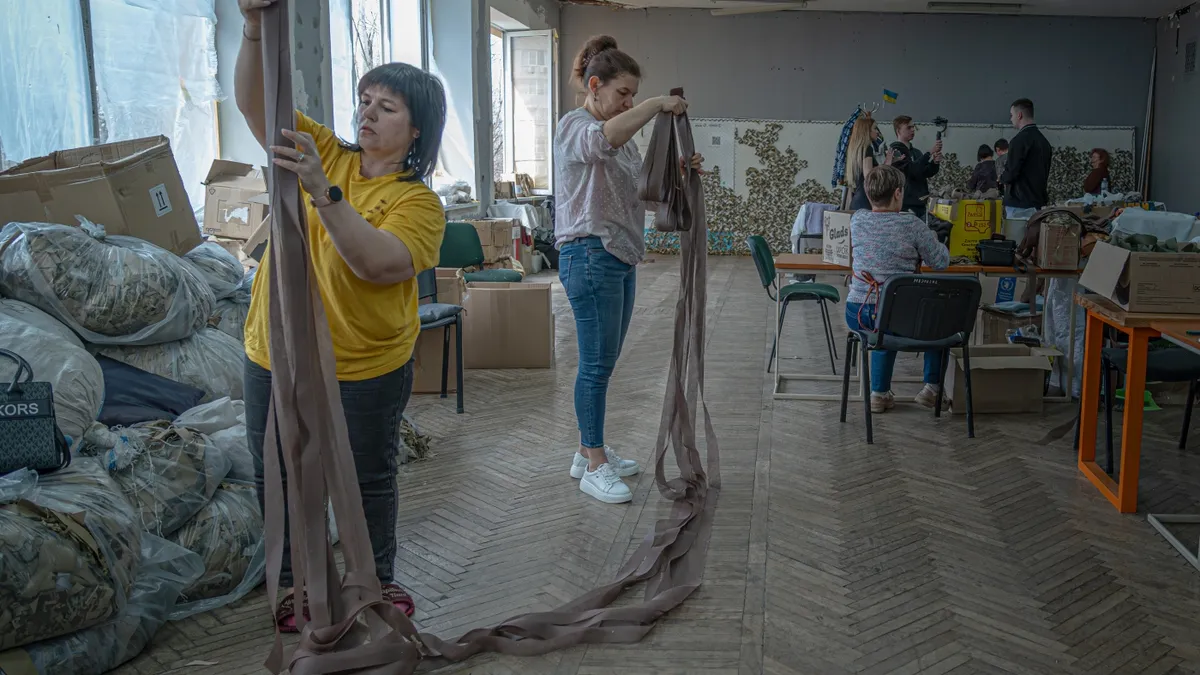
On a recent Saturday morning in Zaporizhzhia, Ukraine, a dedicated group of volunteers gathered at a local youth center to weave strips of cloth into camouflage netting for the Ukrainian army. This city, located in the southeastern province of Ukraine, is crucial as it remains firmly under Ukrainian control, even though approximately two-thirds of the province is currently dominated by Russian forces. The front line is just 25 miles away, but the resolve of the local community stands strong in the face of adversity.
Among the volunteers is 36-year-old Kateryna Kyshkan, who lived for a year and a half under Russian occupation. Her recounting of that time is harrowing: “It was terrible,” she states. “It was very scary because there were a lot of tanks and bombs.” Many residents fled their homes immediately, but Kyshkan chose to stay longer, believing that the Ukrainian army would ultimately save them. By the summer of 2023, however, the situation had grown increasingly dire, making escape more perilous.
Kyshkan illustrates the arduous route she and her 14-year-old daughter took to reach safety in July 2023. To enter Ukraine from occupied territories, one must navigate through Russia or another country like Belarus, often facing Russian checkpoints. These checkpoints involve a detailed search of personal belongings and mobile phones, a process known as filtration, which Kyshkan describes as frightening. Her patriotic Ukrainian tattoo, featuring the vyshyvanka — a traditional needlepoint symbol of Ukrainian resistance — had to be concealed under her long sleeves during this treacherous journey.
The ongoing conflict has seen Russian President Vladimir Putin demand the recognition of four Ukrainian provinces, including Zaporizhzhia, as part of the Russian Federation. The other provinces in question are Kherson, Donetsk, and Luhansk. While the Kremlin claims that residents of these areas chose to join Russia in controversial referendums, these votes have been widely condemned as illegal under international law, with the U.N. General Assembly declaring them void.
Kyshkan recalls the fear that gripped her community when Russian soldiers came to her door with ballots. Many residents chose to hide, while others, paralyzed by fear, felt compelled to comply. The atmosphere of dread is palpable in Zaporizhzhia, where empty streets bear witness to the constant threat of Russian drones and missiles, as sirens wail throughout the day.
Among those working to support the Ukrainian army are 23-year-old Alyona Serdyuk and her partner Sergey Vasylko. They reside in a sixth-floor apartment along with Alyona's parents, who fled their hometown of Komysh Zoria shortly after the war began. Before the conflict, Alyona's family owned a bakery and enjoyed a comfortable life. However, the lawlessness and fear that soon engulfed their home forced them to leave.
Serdyuk shares chilling memories of the terror faced under Russian occupation, emphasizing that Russian soldiers acted without restraint, instilling fear in the community. “If they want to kill, they kill. If they want to confiscate your car, they confiscate your car,” she explains, recounting the tragic night when drunk soldiers killed an entire family on their street. The couple’s former home is now occupied by a family from the Crimean Peninsula, further intensifying their anguish.
Recent comments from Steve Witkoff, former special envoy under President Trump, about the eastern regions of Ukraine have also left a deep impression on the community. His assertion that the majority of residents in these areas desire Russian rule shocked Alyona and her family. “What he said is frightening — it’s terrible,” they voiced in unison, highlighting their deep connection to their homeland.
Vita Serdyuk, Alyona’s mother, reflects on the pre-war atmosphere: “We lived in peace, and it didn’t matter which language you spoke.” The justification often used by the Kremlin for the invasion — to protect Russian speakers in Ukraine — has profoundly altered the family's perception. Now, they view speaking Russian as an act of betrayal and have fully embraced the Ukrainian language.
Despite the dire circumstances, hope remains a constant in their lives. Sergey Vasylko’s grandparents, who chose to stay behind under Russian occupation, maintain a close connection with their family through daily phone calls. However, the conversations are carefully curated to avoid discussing sensitive topics that could jeopardize the couple’s safety.
The ongoing conflict casts a shadow over future plans, including the couple’s hopes for their grandparents to attend their wedding this September. With the situation in their region still fraught with danger, the likelihood of a reunion seems increasingly distant.
As the conflict continues, the stories of resilience and community support in Zaporizhzhia serve as a testament to the strength of the Ukrainian people. Their unwavering commitment to their homeland and each other remains a beacon of hope amidst the turmoil.